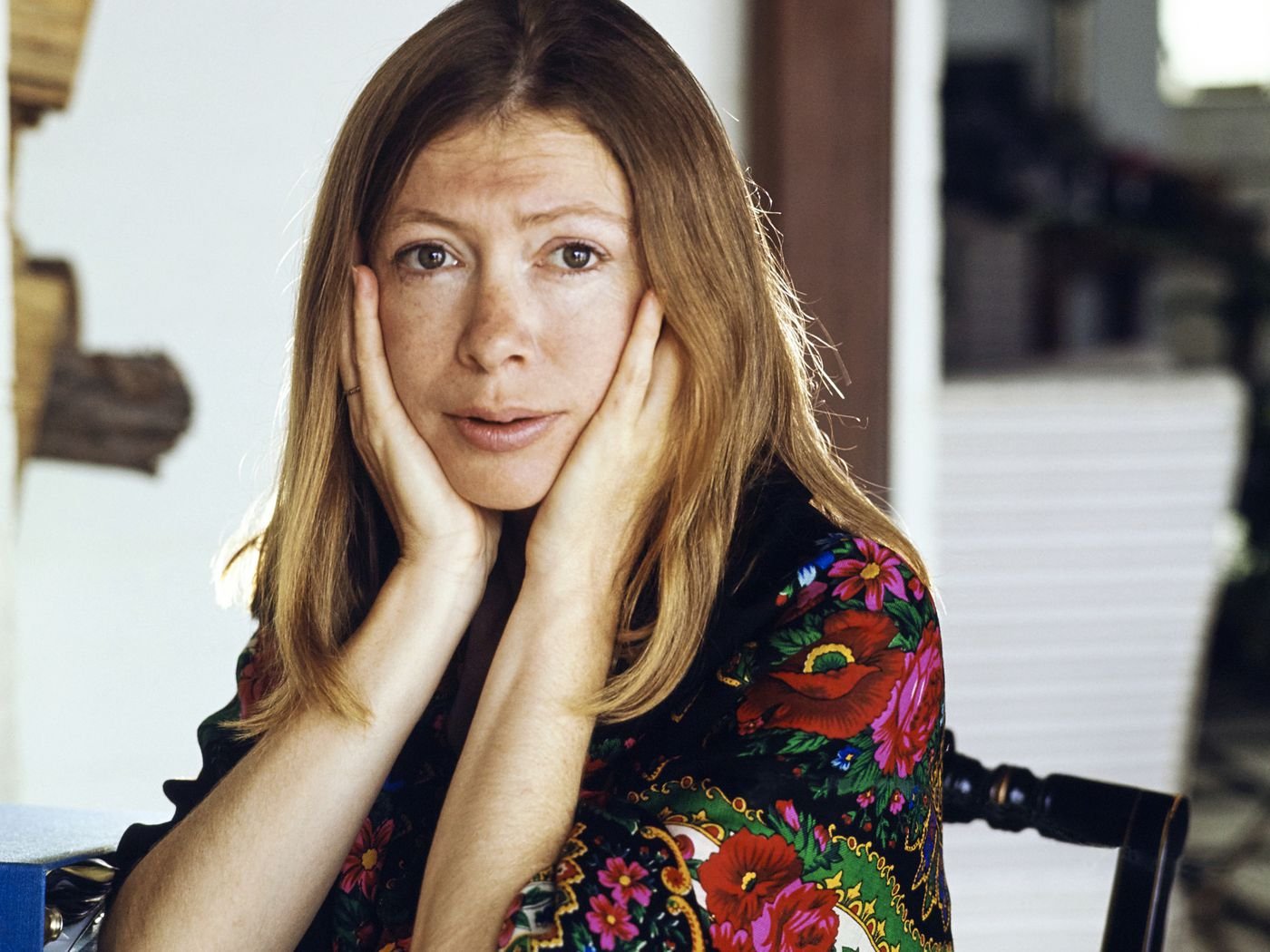Joan Didion - a goodbye
Ten years ago, I wrote this essay and found it just last week. It seemed prophetic when she passed only days later. There are not enough words, magical or otherwise, to capture Didion’s impact on literature or me.
But here’s several hundred.
Joan Didion’s In Bed
In her essay, “In Bed”, Joan Didion briefly recounts her tumultuous relationship with migraine headaches or simply “migraine”, as she often refers to the issue. The title comes from the days she loses to the bed in exquisite pain. Four to five days a month, Didion is rendered helpless against this mysterious inheritance that simultaneously blinds her, causes retching, and makes thinking near impossible. She is frank and detailed, expressing the largess of her pain and the minutiae of the disorder.
Like living in a horror film from which she cannot escape, Didion has battled this menace since its first attack at the tender age of eight. But the essay is not a Camille-esque, ode to a woman ravaged by disease. Rather it is a look at how she has grown in her response to this phantom. In the early years, she accepted the tsk-tsking of those around her that were convinced that a simple pair of aspirin and a spot of sunshine was all the cure she needed. She fought through classes and meetings suffering in solitude as the vise squeezed ever more tightly, believing that her mere will was enough.
The essay continues as her understanding of migraine has grown and her attitude has changed. She takes medicine daily to hold off the barbarians beating at her over-stressed synapses. If she did not, she would cede the vast majority of her waking hours to them. Yet, when the inevitable migraine does come, she has learned to let go. She waves the white flag of battle and takes to bed. Not, as you might think, because she has no fight left but because she has grown to know that there is no victory in an un-matched battle. Didion cannot defeat the migraine but that does not mean that she is defeated by it. By taking to bed, focusing only on the pain rather than its avoidance, she rises twelve hours later clear-minded and in such a state of relief that she see the world with renewed vigor and appreciation. A hard-won victory but it is a victory, none-the-less.
I was attracted to this piece for two distinct reasons. The first is personal. I have suffered at times with migraine headaches, especially in my teenage years. I am now afflicted by a nervous system syndrome that some days leaves me exhausted, depleted, and lying on the couch before the day has even begun. I know the eyes of those who do not understand and felt the shame of one whose body is not reflective of their will or moral character. Secondly, I had seen a television piece on Didion’s recent tome, The Year of Magical Thinking, and found her wit and resolve in the face of the unthinkable, inspiring. Therefore, when I saw her name listed in an anthology, I was immediately drawn to her pieces.
Didion speaks from the first person and her work is immediate and very personal. She describes the pain as one who has been ravaged but left intact to tell her story. She compelling alternates between the visceral and the technical; sharing her efforts to continue her work as a stream of tears ran down one side of her face followed by a list of drugs and their uses. This cross of the intellectual with the emotional made me feel so much more for her. By allowing herself some distance, she gave the reader an opportunity to take in her words and experience them personally. I think that had she simply wrote of the migraines and of the havoc they have wrought in her life, the reader might have tuned out. I think I would have.
Didion writes of the specifics of migraines with an almost medical acuity. She relates the symptoms of others in addition to her own. In a four page essay, more than one page is dedicated to the triggers, drug therapies, and symptomology. Serotonin levels and synthesized LSD are discussed with a similar dryness as a Medical Journal, yet with the personal understanding of one who can readily relive the indicated struggles. She is concise in her words and does not utilize a hyperbolic style. When she does use a metaphor, therefore, it has meaning. After describing the aura period which precedes the migraine, she goes on to elucidate just what a monolithic beast she is facing.
The actual headache, when it comes, brings with it chills, sweating, nausea, a debility that seems to stretch the very limits of endurance. That no one dies of migraine seems to someone deep into an attack, an ambiguous blessing.
I think that there is much for me to learn from Didion. Her writing style is akin to the clean lines of mid-century furniture. With its simplicity of structure, her work has an unembellished surface that reveals the solidity of the work and a surety of mind. My own work is not Victorian in style with excessive gilding and heaviness of words. It is also clearly not destined for a Scandinavian box store. I tend toward the Art Deco in my use of metaphors and word choice. I try for clarity but with a sense of flare.
In reading Didion, I feel the power of choosing the single right word rather than four or five to describe the same thought. I often use words to sidle up to a subject and ease the audience in rather than conveying my message directly. There is definitely room for that but I think my work could be strengthened from incorporating more of Didion’s philosophy. It could make my work feel more confident and assured rather than unsettled and possibly timid. I think that I will be a better writer for it. I might even be a better person for it.
A Decade’s Vision
Since writing this post, I was introduced to the daily dance with Migraine. I suffer regularly and could not live my life as I know it without a large party favor offering of pharmaceuticals. I only thought I understood Didion’s battles before. How does the saying go? You don’t know what you don’t know.
I didn’t know.
That said, I have carried “In Bed” with me this decade and it helped shape my resolve. Knowing there was someone who knew exactly what I knew gave me relief. Now, she has passed to a place of our relief and one where her magical thinking finds her re-united with her love.
Rest In Peace, Joan, but not bed. You’ve earned it.


